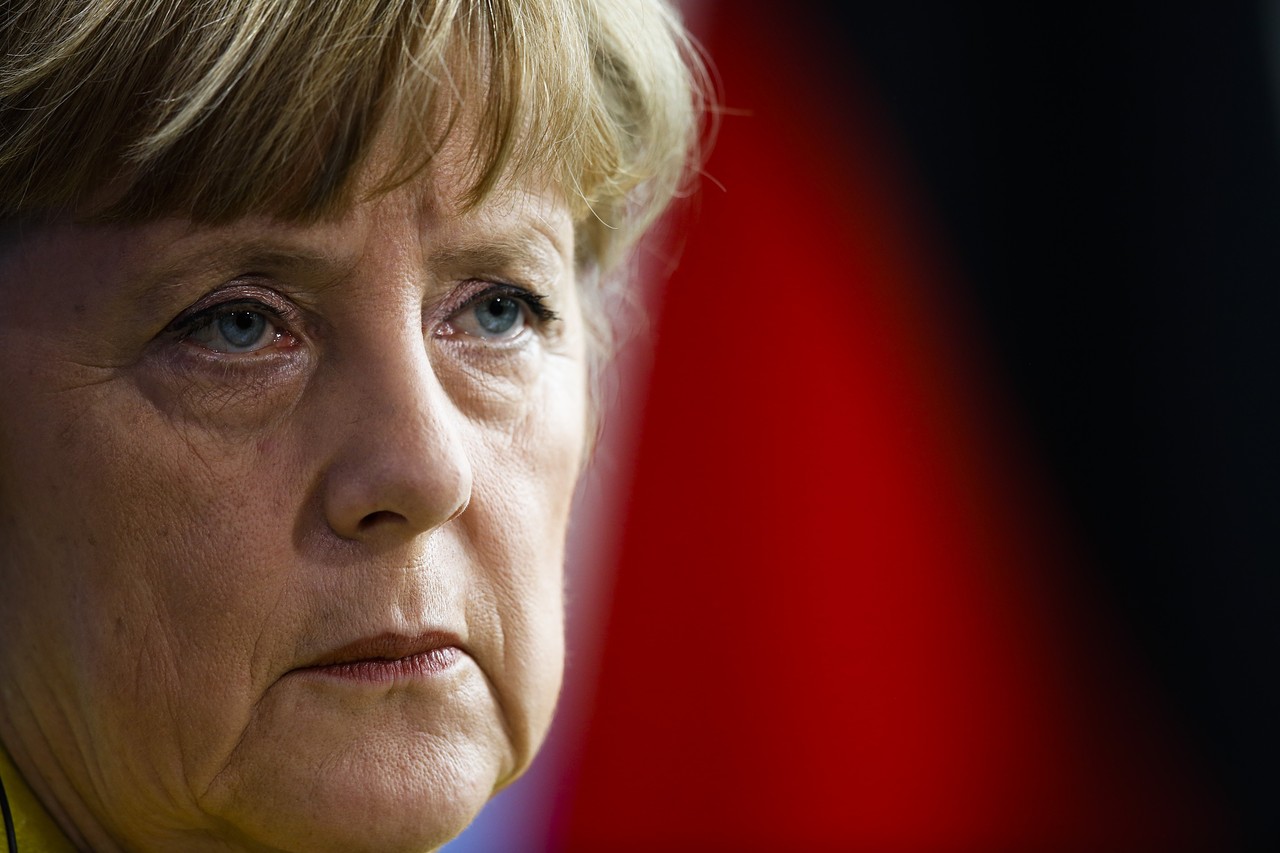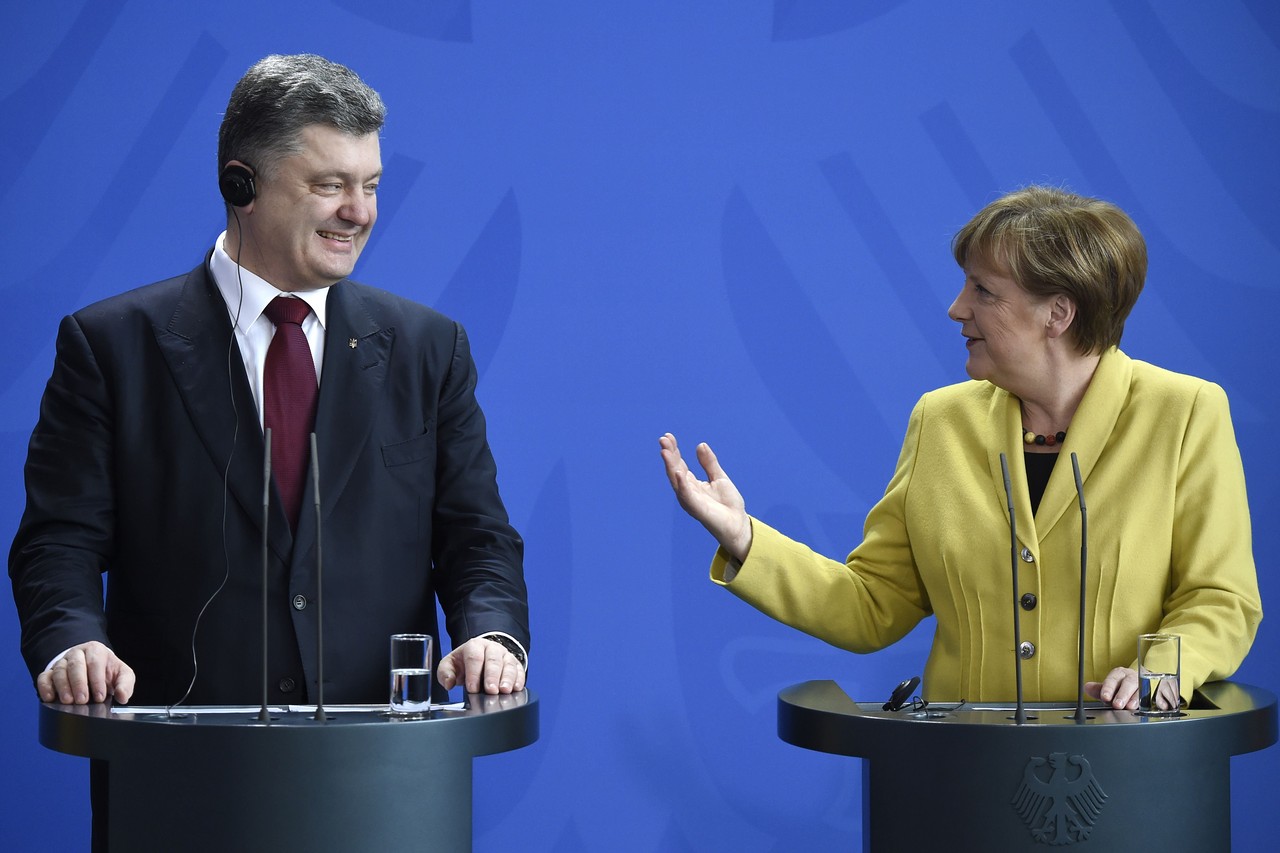Germany’s Angela Merkel Calls on EU to Maintain Sanctions Pressure on Russia
Chancellor urges unity as Putin tries to reinvigorate ties with skeptics such as Italy and Cyprus

German Chancellor Angela Merkel at a joint news conference with Ukraine's President Petro Poroshenko after their meeting in Berlin. Photo: Associated Press
German Chancellor Angela Merkel at a joint news conference with Ukraine's President Petro Poroshenko after their meeting in Berlin.
German Chancellor Angela Merkel Monday called on Europe to maintain sanctions pressure on Russia despite a decline in violence in eastern Ukraine, urging Western unity amid Russian efforts to reinvigorate ties with sanctions skeptics such as Italy and Cyprus.
Ms. Merkel, speaking after meeting with Ukrainian President Petro Poroshenko in Berlin, said a full cease-fire still hasn’t been reached and that pro-Russian separatists were continuing to prevent international monitors from having complete access in the regions they control.
To keep the pressure on Russia, she said, European Union heads of state and government meeting in Brussels later this week needed to commit to maintain current sanctions against Russia until Moscow makes good on the steps outlined in peace deals reached in Minsk, Belarus, in September and February.
“The sanctions and the implementation of the Minsk plan must be connected,” Ms. Merkel said. She will urge her counterparts at the Brussels summit, she added, to agree to a“political commitment that sanctions and the implementation of Minsk are closely connected.”
German Chancellor Angela Merkel and Ukrainian President Petro Poroshenko at the joint press conference.

German Chancellor Angela Merkel and Ukrainian President Petro Poroshenko at the joint press conference. Photo: Agence France-Presse/Getty Images
Ms. Merkel’s firm stance comes as Russia appears to be trying to exploit divisions within Europe over how to proceed with sanctions against Moscow as they come up for renewal in coming months, while violence in Ukraine eases.
Russian President Vladimir Putin welcomed Italian Prime Minister Matteo Renzi, whose government has been hesitant to endorse sanctions, at the Kremlin on March 5 and called Italy a “privileged partner.” President Nicos Anastasiades of Cyprus, an EU nation with close ties to Russia, made a two-day visit at the end of February.
On Monday, Ms. Merkel said Germany was also prepared to endorse tougher sanctions against Russia if the situation worsens—for example, in the case of a separatist offensive against the Ukrainian port city of Mariupol.
“We are also prepared, if need be, for new sanctions,” Ms. Merkel said. But, she added, “they are not an end in themselves. We do not want them.”
It is far from clear whether Europe will be able to maintain a united front. Foreign ministers meeting in Brussels Monday signaled differences on whether to extend sanctions until the year-end, suggesting consensus may be difficult to reach at the summit.
The EU has already extended its sanctions against individuals and firms linked to the Russian takeover of Crimea until September. Now several EU governments, including Germany, are pushing to extend the broader, more powerful sanctions against Russia’s defense, energy and banking sectors until the end of 2015.
That would tie the penalties to Moscow’s implementation of the cease-fire agreement reached in Minsk. That deal requires, in part, that Ukraine controls its border with Russia by the end of 2015.
The Minsk deal has resulted in a fragile cease-fire and the pullback of heavy equipment on both sides. But some Western diplomats believe it will only have lasting value if the Russia-Ukraine border is secured so that Russia can’t keep sending arms and weapons to separatists.
They argue that extending sanctions is crucial to ensure Russia follows through on its agreement to give Ukraine control over its border by the end of the year. Speaking alongside Ms. Merkel, the Ukrainian president promised to do his part to carry out the Minsk agreements, insisting there was “no alternative” to that deal.
Fighting in eastern Ukraine has subsided since the Feb. 12 cease-fire. Days after the truce was signed, Kremlin-backed militants seized the transport hub of Debaltseve, but haven’t made any significant further advances.
Both sides say they have moved artillery back in accordance with the deal, although monitors say they have been unable to verify this without full access to the final destinations of convoys.
Ukraine’s government and the militants frequently accuse each other of violations of the truce. Ukrainian officials say the militants are using the lull in fighting to regroup, possibly for an attack on the Azov Sea port of Mariupol, a charge the rebels deny.
Under the terms of the truce, Ukraine’s parliament was supposed to pass a decree by Sunday designating the area held by the militants that will be granted increased autonomy. A draft decree by President Petro Poroshenko was posted on parliament’s website Saturday, and the chamber’s speaker said it would be voted on this week.
A representative of one of the militant groups, Vladislav Deinego, initially welcomed the move, but later said the decree “isn’t viable” as it is based on local elections that didn’t take place in December. Parliamentary Speaker Volodymyr Groysman said the decree demarcated the area where local elections will be held.
Russian officials, meanwhile, have been accusing Kiev of dragging its feet on fulfilling the political elements of the deal, setting new conditions on moves they had promised to take under the Minsk agreement.
Mr. Poroshenko is under pressure from political rivals and a defiant public to not bend too far to the demands of Russia and the rebels it is backing. He said late last week that Ukraine is implementing the Minsk agreement, but at the same time strengthening its armed forces to halt any further attacks.
Source : http://www.wsj.com/articles/eu-ministers-divided-over-extending-sanctions-against-russia-1426504541
(인턴 임태현)
